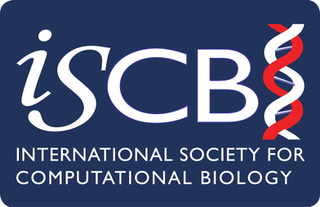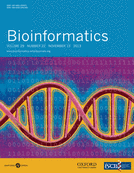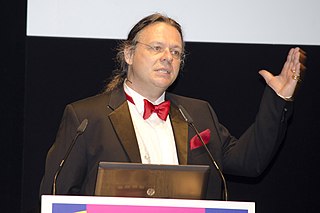
Svante Pääbo is a Swedish geneticist and Nobel Laureate who specialises in the field of evolutionary genetics. As one of the founders of paleogenetics, he has worked extensively on the Neanderthal genome. In 1997, he became founding director of the Department of Genetics at the Max Planck Institute for Evolutionary Anthropology in Leipzig, Germany. Since 1999, he has been an honorary professor at Leipzig University; he currently teaches molecular evolutionary biology at the university. He is also an adjunct professor at Okinawa Institute of Science and Technology, Japan.

The Max Planck Institute for Evolutionary Anthropology is a research institute based in Leipzig, Germany, that was founded in 1997. It is part of the Max Planck Society network.
The Neanderthal genome project is an effort of a group of scientists to sequence the Neanderthal genome, founded in July 2006.

Eugene Wimberly "Gene" Myers, Jr. is an American computer scientist and bioinformatician, who is best known for contributing to the early development of the NCBI's BLAST tool for sequence analysis.

The International Society for Computational Biology (ISCB) is a scholarly society for researchers in computational biology and bioinformatics. The society was founded in 1997 to provide a stable financial home for the Intelligent Systems for Molecular Biology (ISMB) conference and has grown to become a larger society working towards advancing understanding of living systems through computation and for communicating scientific advances worldwide.

Bioinformatics is a biweekly peer-reviewed scientific journal covering research and software in bioinformatics and computational biology. It is the official journal of the International Society for Computational Biology (ISCB), together with PLOS Computational Biology. Authors can pay extra for open access and are allowed to self-archive after 1 year.

Vindija Cave is an archaeological site associated with Neanderthals and modern humans, located in the municipality of Donja Voća, northern Croatia. Remains of three Neanderthals were selected as the primary sources for the first draft sequence of the Neanderthal genome project in 2010. Additional research was done on the samples and published in 2017.

Denisova Cave is a cave in the Bashelaksky Range of the Altai Mountains, Siberian Federal District, Russia. The cave has provided items of great paleoarchaeological and paleontological interest. Bone fragments of the Denisova hominin originate from the cave, including artifacts dated to around 40,000 BP. Remains of a 32,000-year-old prehistoric species of horse have also been found in the cave.
The ISCB Accomplishment by a Senior Scientist Award is an annual prize awarded by the International Society for Computational Biology for contributions to the field of computational biology.

Burkhard Rost is a scientist leading the Department for Computational Biology & Bioinformatics at the Faculty of Informatics of the Technical University of Munich (TUM). Rost chairs the Study Section Bioinformatics Munich involving the TUM and the Ludwig Maximilian University of Munich (LMU) in Munich. From 2007-2014 Rost was President of the International Society for Computational Biology (ISCB).

Alfonso Valencia is a Spanish biologist, ICREA Professor, current director of the Life Sciences department at Barcelona Supercomputing Center., of Spanish National Bioinformatics Institute (INB-ISCIII), and coordinator of the data pillar of the Spanish Personalised Medicine initiative, IMPaCT. From 2015-2018, he was President of the International Society for Computational Biology.

Ust'-Ishim man is the term given to the 45,000-year-old remains of one of the early modern humans to inhabit western Siberia. The fossil is notable in that it had intact DNA which permitted the complete sequencing of its genome, one of the oldest modern human genomes to be so decoded.

Alexander George Bateman is a computational biologist and Head of Protein Sequence Resources at the European Bioinformatics Institute (EBI), part of the European Molecular Biology Laboratory (EMBL) in Cambridge, UK. He has led the development of the Pfam biological database and introduced the Rfam database of RNA families. He has also been involved in the use of Wikipedia for community-based annotation of biological databases.

Sarah Amalia Teichmann is a German scientist who is head of cellular genetics at the Wellcome Sanger Institute and a visiting research group leader at the European Bioinformatics Institute (EMBL-EBI). She serves as director of research in the Cavendish Laboratory, at the University of Cambridge and a senior research fellow at Churchill College, Cambridge.
ISCB Fellowship is an award granted to scientists that the International Society for Computational Biology (ISCB) judges to have made “outstanding contributions to the fields of computational biology and bioinformatics”. As of 2019, there are 76 Fellows of the ISCB including Michael Ashburner, Alex Bateman, Bonnie Berger, Steven E. Brenner, Janet Kelso, Daphne Koller, Michael Levitt, Sarah Teichmann and Shoshana Wodak. See List of Fellows of the International Society for Computational Biology for a comprehensive listing.
Satoru Miyano is a professor and the director of the M&D Data Science Center at Tokyo Medical and Dental University. He was awarded fellowship of the International Society for Computational Biology (ISCB) in 2013 for outstanding contributions to the fields of computational biology and bioinformatics.
Genetic studies on Neanderthal ancient DNA became possible in the late 1990s. The Neanderthal genome project, established in 2006, presented the first fully sequenced Neanderthal genome in 2013.
Viviane Slon is a paleogeneticist at the Max Planck Institute for Evolutionary Anthropology. She identified that a teenage girl born 90,000 years ago had both Neanderthal and Denisovan parents. She was selected as one of Nature's 10 in 2018.
Nicholas James Patterson is a mathematician working as a staff scientist at the Broad Institute with notable contributions to the area of computational genomics. His work has appeared in scientific journals such as Nature, Science and Nature Genetics. His research has brought a better understanding of early human migrations. He is among the group of scientists who have sequenced the Neanderthal genome in 2010. This was followed by the sequencing of a much higher quality Neanderthal genome, where the subject was from the Altai Mountains, in 2014. These studies have uncovered some unexpected facts about the interbreeding between archaic and modern humans.

The 2022 Nobel Prize in Physiology or Medicine was awarded to the Swedish geneticist Svante Pääbo "for his research in the field of genomes of extinct hominins and human evolution". It was announced by Thomas Perlmann, secretary of the Nobel Assembly at Karolinska Institutet in Stockholm, Sweden, on 3 October 2022.












